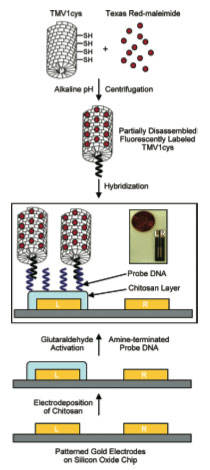 |

|
 |
Diagram for the DNA probe directed assembly of TMV1cys nanotemplates onto a readily addressable site. L and R represent left and right electrodes. Inserted picture shows an actual chip. |
|
Herbert Rabin Distinguished Professor Reza Ghodssi (ECE/ISR/UMERC/NanoCenter) has received a new three-year grant from the National Science Foundation worth $401,712 for research on novel, biological nanofabrication processes for the development of small-scale energy storage devices utilizing the Tobacco mosaic virus (TMV). Ghodssi is the principal investigator (PI) for the research project, titled "Nanofabrication Using Viral Biotemplates for MicroElectroMechanical Systems (MEMS) Applications." Professor James Culver from the Center of Biosystems Research at the University of Maryland Biotechnology Institute is Co-PI.
The objective of the research is to make use of the self-assembly and metal-binding properties of a biological nanostructure, the TMV, in the development of novel functional materials and fabrication processes for energy microsystems applications. The TMV is a high aspect ratio cylindrical plant virus that can be genetically engineered to include amino acids with enhanced metal-binding properties. These genetic modifications facilitate electroless plating of the molecules as well as self-assembly onto various substrates. The developed processes will be incorporated in the fabrication of new, nanostructured small-scale energy storage devices.
More information about the research can be found at the NSF website:
http://www.nsf.gov/awardsearch/showAward.do?AwardNumber=0927693
Additional information:
JMM Paper: http://www.ece.umd.edu/~ghodssi/ghodssi-pdf/Gerasopoulos_JMM_October2008.pdf
Nano Letters: http://pubs.acs.org/doi/pdf/10.1021/nl051254r
July 27, 2009
|

